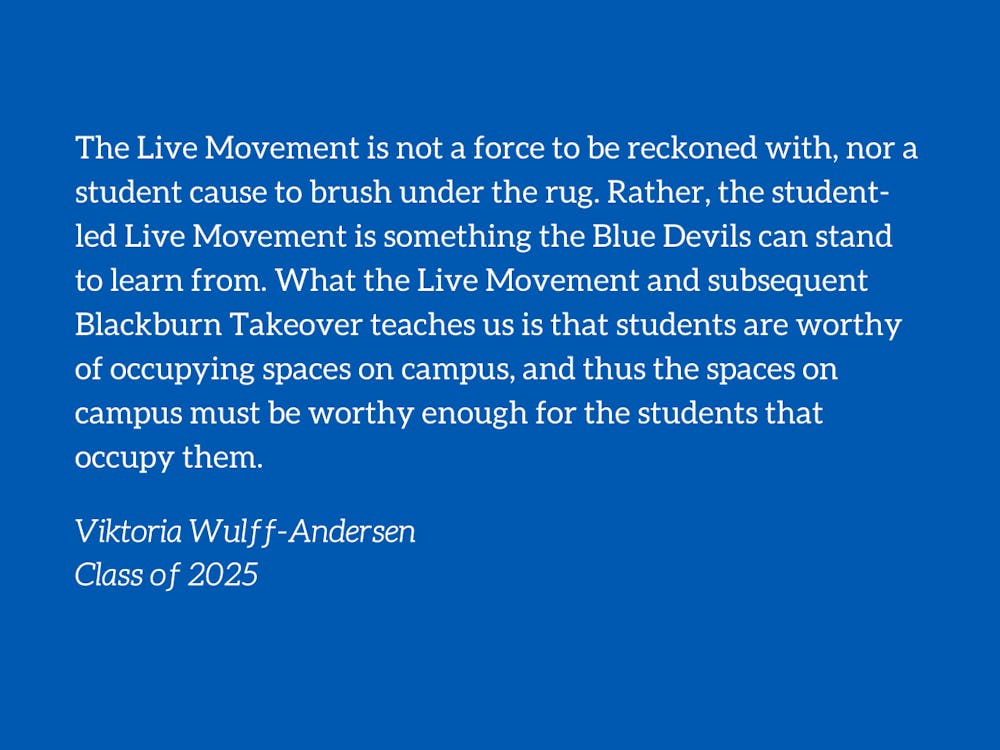On October 26, the Asian Students Associations, Mi Gente, Duke Diya, the Asian American Alliance, Asian American Studies Working Group at Duke University, ASEAN and Mobilizing Asian Students Together released a letter in conjunction with DSG’s Equity and Outreach Committee calling out the administration for ignoring student concerns about the lack of accessible cultural spaces on campus and instead deciding to move the Career Center into the Bryan Center. The letter is formed on the foundation of decades-old demands for improved cultural spaces on campus—particularly for Asian, Latino, Black and Indigenous students, as well as students with disabilities. The letter is formed on the foundation of decades-old demands for improved cultural spaces on campus—particularly for Asian, Latino, Black and Indigenous students, as well as students with disabilities—just as the Howard University’s recent Live Movement was formed on decades-old demands for improved residential structures within Howard University dorms. And just like the Live Movement recognized the need for student advocacy in student spaces, the letter ended by recognizing that the “Bryan Center is a center for students, and as such, student voices and agency should be at the forefront of how this space is utilized.”
The parallels end there, however. Duke University has a lot to learn from the dedication and support that makes the Live Movement so remarkable.
Chandler Robinson, a Howard University first-year student and member of the Live Movement, is evidence of that dedication. She had been camping out at Blackburn Student Center for two weeks when she said, “We’re not moving. I think that they have yet to take us seriously. I think that they see us as children. But we are young adults who are being exposed to the hazardous conditions that can affect us for the rest of our lives.”
With her statement, Robinson refers to the administration at her university that has been dismissive of the Live Movement and its “Blackburn Takeover.” The Live Movement—which Robinson proudly claims to be a part of—was formed in recognition of student complaints about rodents, flooding, mold and other haphazard conditions in the residence halls—conditions that have been plaguing Howard University for decades. The Blackburn Takeover began the week of October 11 and will continue until administration shares a detailed “housing plan” that addresses all housing-specific issues and promises immunity for all participants in the protests; the permanent reinstatement of student, faculty and alumni positions on the Board of Trustees; and an in-person town hall with Howard University President Wayne Frederick and his administrative staff.
While Robinson was correct in stating that the administration has yet to take the Live Movement seriously—with President Frederick releasing a statement calling for the end of the Blackburn Takeover under the excuse that the issues students were fighting against were “not widespread”—the Live Movement is not a force to be reckoned with, nor a student cause to brush under the rug. Rather, the student-led Live Movement is something the Blue Devils can stand to learn from. What the Live Movement and subsequent Blackburn Takeover teaches us is that students are worthy of occupying spaces on campus, and thus the spaces on campus must be worthy enough for the students that occupy them. The Howard University students behind the protests recognize the need for buildings that can foster the comfort and safety needed for them to accomplish their aspirations. They recognize the importance behind the quality of facilities and resources that support them as they embark on their academic journeys to become intertwined with the university’s ethos. They recognize that advocating for the needs of themselves and their peers is the most crucial use of their voices.
Admittedly, Duke students have already imparted these lessons within this past year alone. Junior Brandon Scaberry spoke up with visual evidence when he encountered a bed bug in the second floor of the Perkins Library, and the first-years spoke up with their concerns about QuadEx when the administration formally announced their plans for their renovations to the housing system in the next academic year. Still, Duke has much to take away from the factors that make the Live Movement so remarkable. Particularly, the recognition of how students of marginalized identities have been historically denied the resources and comfort Howard Students are now demanding drives the Live Moment’s successful grand-scale coordination, something Duke students must look into as they grapple with spaces being taken away from marginalized identity groups.
This brings us back to the letter addressed to the Duke administration about the lack of identity communal spaces in BC. While the letter shares many similarities with the Live Movement, this letter and its outlined cause lacks the widespread backing of the Live Movement, making it all the less likely to be taken seriously by Duke’s administration.
Alumni, graduate and undergraduate students and even local community leaders need to begin publicly supporting this letter, rather than just privately nodding along to its demands within the comforts of their own bedrooms. Part of what makes the Live Movement so remarkable are the Black leaders and alumni that are standing behind the students. Another part of what makes the Live Movement so remarkable are the masses of students banding together for this one cause, creating a public demonstration with its own hashtag. While the push for greater cultural spaces at Duke doesn't need to mirror the Live Movement’s footsteps, it deserves legitimacy through the garnering of community support and through a greater accepted recognition previously seen in the campus’s history that students—especially those of marginalized identities—are deserving of the spaces they occupy within Durham.
Viktoria Wulff-Andersen is a Trinity first-year. Her column runs on alternate Mondays.
Get The Chronicle straight to your inbox
Signup for our weekly newsletter. Cancel at any time.
Viktoria Wulff-Andersen is a Trinity junior and the opinion editor of The Chronicle's 119th volume.

